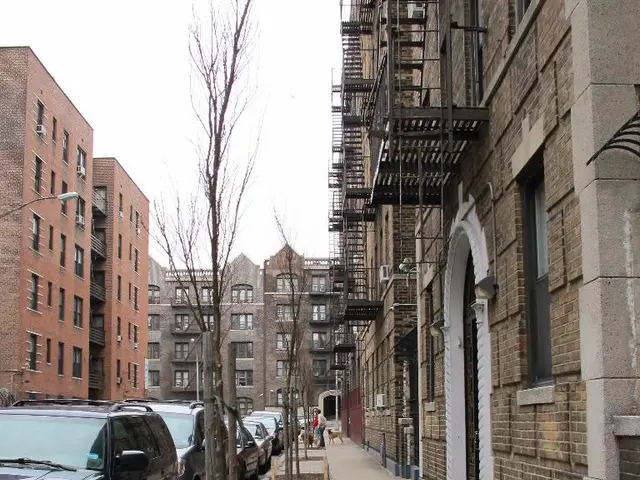Ran Away from the USA: Trump Drives Canadians to Vacation in Mexico
Visitors from Canada flock to Mexico due to actions by U.S. President Trump
In a bizarre turn of events, Donald Trump's policies have sparked a surge in Canadian tourists flocking to Mexico. This shift comes as the country grapples with a significant increase in visitors, particularly from the North. Airlines are already taking notice, launching new routes to capitalize on these new vacationers.
Trump's erratic tariff policy, favoring Mexico over Canada, seems to have played a role. While he spared Mexico from recent tariffs, he tightened rules for imports beforehand, imposing a 25% tariff on goods not covered by the USMCA free trade agreement. This has strained the economic relationship between the USA and Canada, yet it has benefited Mexico as a tourist destination.
Capitalizing on Trump's unpredictability, Canadians seeking political refuge from the USA are choosing to spend their vacations south of the border. According to a "Financial Times" report, the number of Canadian visitors to Mexico has surged recently, leading to some airlines establishing new flight routes.
Air Canada and Air Transat, for instance, have announced new non-stop flights to Guadalajara and are increasing the frequency of their winter connections to other Mexican destinations. This shift in travel behavior is evident not only in the rise of Canadian tourists but also in the decrease of flights to the USA—with Canadian flights to the USA decreasing more than 13% in the same period.
The Mexican tourism industry may find some solace in these developments, as it currently grapples with a downturn. In 2023, tourism accounted for about 8.6% of Mexico's GDP. The industry might profit from the increased interest in Mexico as a tourist destination. The Mexican Tourism Minister, Rodríguez Zamora, told the "Financial Times" that the relationship between Mexico and Canada has become stronger, echoing the Canucks' preference for a more friendly policy over the USA.
The change in travel preferences is not just limited to Canadians. Reports of harsh treatment of tourists upon entry to the USA, along with patriotic boycotts of American goods and travel due to Trump's threats and new high tariffs, have further deterred travel to the USA, even among Mexicans. In March of this year, the number of Mexican tourists flying to the USA decreased by almost a quarter compared to 2024, according to the US Commerce Department.
In response, Trump dismissed these concerns, claiming that the USA is treating tourists well. However, he doubted that a little nationalism could be at play, overlooking the impact his policies have had on regional travel patterns.
Sources: ntv.de, jki
- North America
- Tourism Industry
- Airlines
- Canada
- Mexico
- The community policy enacted by Trump has led to a rise in Canadian tourists heading to Mexico, consequently impacting the North American tourism industry.
- Vocational training in the tourism sector might benefit from the increased influx of visitors, as the industry strives to meet the demand.
- The surge of Canadian tourists in Mexico has caught the attention of airlines, prompting them to launch new routes to capitalize on this new market.
- Trump's tariff policy, favoring Mexico over Canada, seems to be one of the reasons why Canadians are choosing to vacation in Mexico, rather than the USA.
- The financial consequences of Trump's tariff policy have strained the economic relationship between the USA and Canada, making Mexico a more attractive tourist destination.
- With the rise of Canadian tourists comes an opportunity for the retail sector in Mexico to benefit from increased sales, particularly in popular tourist destinations.
- The popularity of WhatsApp as a communication tool has likely made it easier for Canadians to arrange their travels to Mexico, given the platform's widespread use in the country.
- The strong rapport between Canada and Mexico, now bolstered by increasing tourism, stands in contrast to the strained relationship between Canada and the USA.
- The new tariff policy has had far-reaching consequences, impacting not just the economic landscape but also travel patterns across North America.
- The aerospace and automotive industries in Mexico may also see benefits from the increased tourism, as more visitors expose them to potential business opportunities.
- The interior-design sector in Mexico could potentially capitalize on the surge of Canadian tourists by catering to their preferences for vacation accommodations.
- The offering of cooking classes and food-and-drink experiences could entice tourists, providing them with a taste of global cuisines and further boosting the local economy.
- The transportation sector in Mexico, including public transportation and car rental services, will likely experience growth as a result of the increased tourism.
- Leadership in the tourism industry is crucial to navigating these challenges and seizing opportunities, with an emphasis on diversity-and-inclusion to cater to a broad range of tourists.
- Cybersecurity in the tourism sector is paramount, particularly in an age where digital disruptions can significantly impact the guest experience.
- Lifestyle choices, such as those associated with outdoor-living and sustainable-living, may resonate with Canadian tourists seeking a connection to nature during their vacation.
- The fashion-and-beauty industry in Mexico could capitalize on the increasing influence of Canadian tourists, adapting to their preferences to cater to them more effectively.
- The dining industry in Mexico stands to gain from the increased number of tourists, offering a wide variety of food options to cater to diverse tastes.
- Family-dynamics play a role in vacation choices, with Canadians seeking locations where their loved ones can enjoy themselves and create lasting memories.
- The housing-market in Mexico could benefit from the surge of tourists, with properties in popular destinations experiencing increased demand.
- Personal-finance management is essential for Canadians as they choose their vacation destinations, considering factors such as currency exchange rates and accommodation costs.
- Housing improvements and home-improvement initiatives could attract Canadians seeking long-term investment opportunities in the Mexican real-estate market.
- The baking and beverages industries in Mexico might witness growing interest as Canadians seek out unique food experiences during their travels.
- The love-and-dating scene may be altered by the influx of Canadian tourists, potentially leading to cross-cultural relationships and interactions.
- Businesses in Mexico are expected to profit from the increased number of Canadian tourists, with careers in hospitality and service emerging as promising options.
- The citizenship and housing-related issues arising from this migration pattern could become subjects of policy-and-legislation debate in both countries.
- Car-accidents, fires, and other accidents may increase with the rise in tourism, necessitating the implementation of safety measures by authorities.
- Crime-and-justice issues, particularly those related to street crime and petty theft, could pose challenges to tourists in unfamiliar and densely populated destinations.
- Public safety and cooperation between authorities in both Canada and Mexico will be crucial in addressing these issues and ensuring the continued growth of the tourism industry.
- In the long run, the positive economic impacts of increased tourism from Canada could lead to further improvements in the energy, industry, and finance sectors in Mexico.






